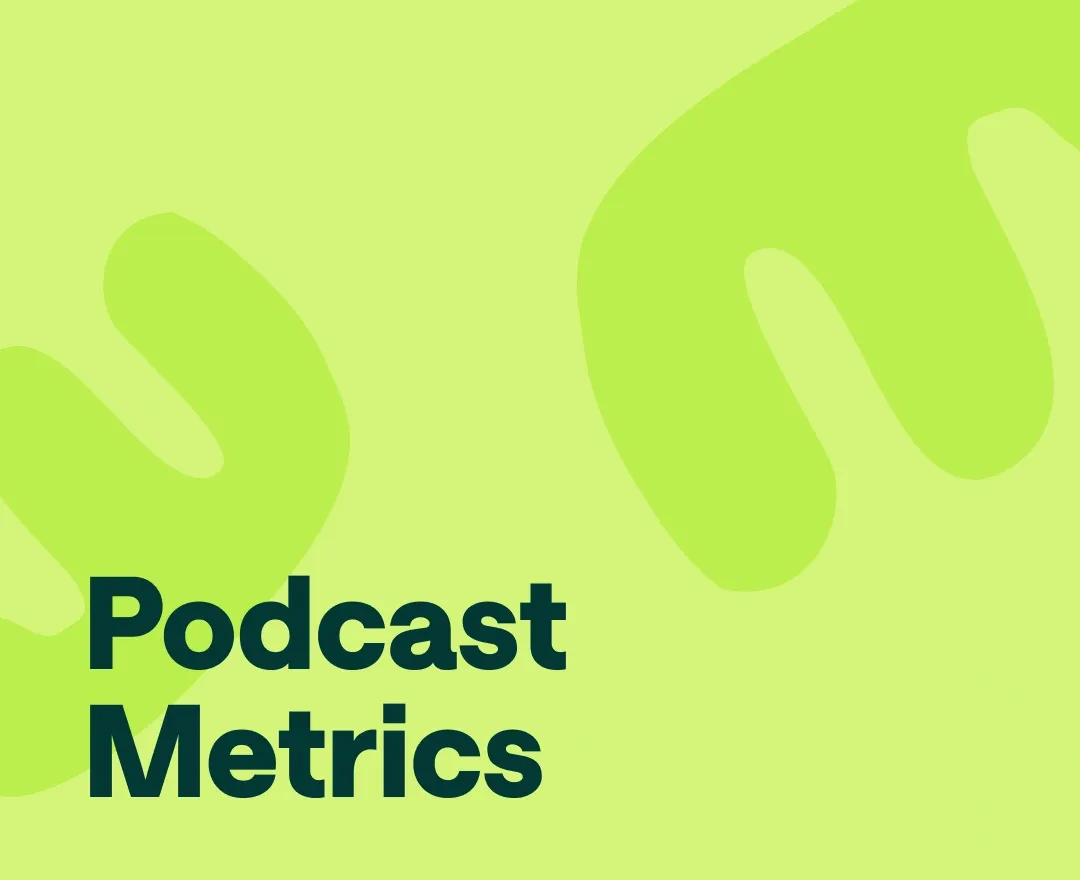Tracking your podcast success can be complex. The podcast is a decentralized medium, and unlike music/video streaming, the point of consumption happens across different devices and platforms, which means it is being downloaded onto a device through which your listeners actually listen to your podcast. Here come podcast performance metrics.
There are a lot of podcast performance metrics you should consider to get real and powerful insights about your podcast's success which can be confusing sometimes. There are different podcast directories each having different ways of measuring performance metrics, and unfortunately, it isn't easy to figure out clear data. Let's go through 14 essential podcast performance metrics you need to track in 2023 to better understand if your podcast is successful.
How to measure podcast success
Here are the key podcast performance metrics you need to track to help set benchmarks for your show:
1. Subscriptions
Subscriptions refer to the number of listeners subscribing to your RSS feeds or have opted in to be notified once a new episode comes out. Though it's hard to measure the number of subscribers, and there is no single source for that, considering that all apps use different methodologies to count subscribers, it is important for your podcast as those form the growth of your show.
2. Listeners per episode
The number of your podcast listenership is an important indicator of your content's performance. It can be tough to find out how many people listen to your episodes after downloading, but some podcast hosting platforms give insights on this, even though those are not exact numbers. Besides, embedded players like SoundCloud also allow you to look at the total number of plays an episode gets, giving a rough estimation of how many podcast listeners you have.
3. Downloads per episode
The number of times your episode has been downloaded to a mobile device indicates the growth and its popularity among your listeners. This performance metric also helps you gauge if your content, titles, and format are engaging enough for your audiences. There are podcast analytics platforms providing information on how many times your podcast is being downloaded, your audience location, age, devices they use to listen to your episodes, and other useful information, that you can use to find more listeners, as well as relevant sponsors to pitch your podcast to.
4. Downloads by the time of the day
This performance metric will give you insights on what is the best time of the day to publish episodes. Knowing the weekday and the most active hour of the day can help set your schedule on publishing so that to have a fresh episode at the time when people are expecting it.
5. Listeners Location
Understanding in which countries your podcast is the most popular will enable you to engage with your audience in the right manner and find new opportunities to market your show. Plus, the breakdown of your target audience location can help you plan a live tour and do more targeted marketing.
6. Average Listening Time
This performance metric is a key indicator for podcasters. Knowing the average listening time for an episode will help you understand the ideal length of the episode you need to have to keep your audience engaged.
7. Top Episodes
Tracking the top-performing content can tell you exactly what your listeners want to listen more about. If it was a specific topic, then do it regularly and if it's more guest interviews that are attractive to your audience, try to invite more of them.
8. Audience demographics
Your audience demographics is a key performance metric important for you to know as a podcaster. To improve your podcast quality in terms of content and reach, you need to know and utilize your audience demographics. It can be challenging to figure out who your audience is and what they are about since that information isn't always easily accessible. To pin down your audience, you can use statistics from your podcast hosting service, social media, and Google Analytics connected to your website that gives an array of information about almost everything related to your website.
9. Listens by Source
Understanding how your podcast is listened to, tracking direct listens, embeddable player listens, and those via your feed gives powerful insight and will indicate where to focus your growth efforts.
10. Social Sharing
Always keep an eye on what people share and say about your podcast. Social listening is important, and the number of likes, shares, and link clicks of your social media posts give valuable info. Social media metrics help you gauge your podcast's popularity on social platforms.
11. Reviews and Ranking
Podcast reviews and rankings for each episode are vital as they affect how likely people find your podcast. If you have a lot of positive reviews and high rankings, that means more people are listening to your podcast. Therefore the chances to grow faster are high. These metrics tell you what type of content works best with your audience and what you need to do to improve your podcast's overall quality.
12. Website traffic
Having a website for your podcast is much recommended and publishing a new episode each time will increase traffic to your website depending on the quality of your episode. Traffic will also tell you which episodes are interesting to your audience and what you should focus on.
13. Bounce rate
Bounce rate metric measures when your audience left after visiting your website. Ideally, you want your visitors to click through your website, indicating to Google that your podcasting website has valuable content. This metric also gives insights on which topics and artwork of your podcast perform well.
14. Backlinks
When another website links to your podcast, that link is called a backlink or inbound link. It's important to monitor the number of backlinks your podcast is getting and the websites the backlinks come from. Tracking backlinks is crucial to understanding your podcast's reach and authority. You can use various tools to track and find backlinks efficiently. A high number of backlinks from quality websites helps you increase your podcast SEO rankings, build your reputation and grow podcast subscribers. To wrap it up, it's not an easy job to get full data on your podcast performance, but using many different tools will give you a better understanding of your podcast. Analyzing and breaking down the formula of what makes a successful episode for your audience will guarantee the growth of your podcast.








